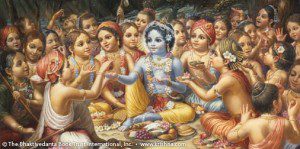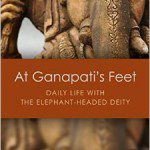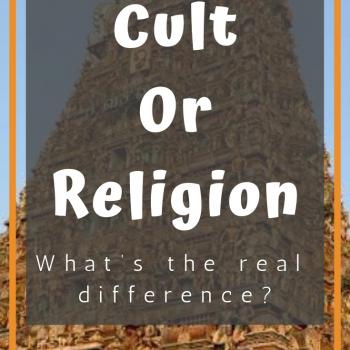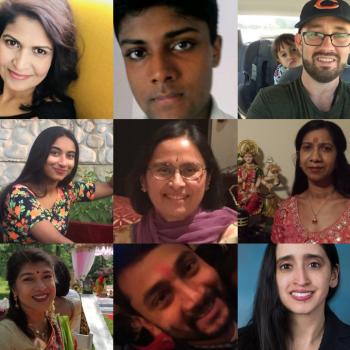As I’ve said before, I know a lot of atheists and am very comfortable with most atheists. We have one really big thing in common: frustration at the way evangelical religions operate. So I enjoy atheist blogs because I can relate to that.
It has always struck me as odd, though, that it seems like many atheists go from Christian to nothing and never consider any other possibilities!
Once they stop believing in the Christian God it’s like there couldn’t possibly be a way to believe in divinity in any way at all. Perhaps many of them think all religions are essentially the same. But Hinduism is quite different from the Abrahamic conception of God. It really surprises me that more people leap straight to atheism rather than try Hinduism. Or perhaps some of them have been burned by religion and are wary but eventually try other types of faith.
Because of this curiosity of mine I was delighted that one of my fellow non-Indian Hindu friends was willing to write a piece for me about his experience going from Christianity to Atheism to Hinduism. He has a blog at Dancing With Narayana.
Here is his story…
Being from the southern United States, it would come as no surprise that I was raised as a Protestant Christian. Being from Georgia, it would come as an even less surprise that I was raised as a Southern Baptist. After all, Southern Baptism is the second largest Christian denomination in the United States (after the Catholic Church), and is the largest Protestant denomination. Heck, the Southern Baptist Convention was actually founded about 20 minutes from where I live in the city of Augusta. Southern Baptism is so ubiquitous with the southern United States, that unless one wears a religious symbol displaying otherwise (such as a hijab, Star of David, a pendant of a saint, etc.), it is generally assumed that one is a Baptist.
This is where I come in. I’m just your average, 20-something, white dude from Georgia who can easily pass as Baptist to the unsuspecting eye. I generally no longer wear pendants or anything else that would “show off” (so to speak) my religious identity, and can easily blend in to my surroundings. That being said, there is more to my religious identity than can be seen by those who don’t know me personally. Already a minority faith in the United States, made even more obscure once one goes down into “Jesus Land” (as the south is oh so affectionately called). If you don’t mind, I would like to tell you, dearest readers, my personal journey from Southern Baptism, to atheism, before finally coming to Hinduism. As well as and everything in between.
As aforementioned, being from Georgia, I was raised in a Southern Baptist family. I remember us being a typical devout family that can be found on any street. Unless one was sick, dying, or dead, we went to church practically every single sunday. We had the Bible read to us everyday, my mom volunteered at church functions, and I had memorized a plethora of prayers by the time I was 4. When I got older, we made going to church on Wednesday youth group a regular occurrence (something I didn’t particularly enjoy, but we’ll get to that later), and I had the joy of going to bible camp 3 years in a row. My mom even listened to contemporary Christian music exclusively for about 5 years. Point being, God and Christianity were a part of my identity and culture growing up, and for a long time was all I actually knew. But we’ll get to that later as well.
Although we did all of these things growing up, it never really clicked with me as to why we were doing them. Yes, we went to church and were a part of the community, but even at a young age, it never occurred as to why we were doing any of this. It was just something that “good” people did. To be honest, the only reason I liked going to church was because I got to draw and have snacks during Sunday school. I never actually paid attention to the stories or lessons being taught and would wonder what game I would play on my Playstation when I got home.
But of course, once we grow up, it is said that we must put childish things away. When I was too old for Sunday school, I would stay with my family to listen to sermons. For a while I resisted actually paying attention, if only because church was just so boring. Despite the stereotypes, most Baptist churches don’t really have the lively music and dancing in the aisles. Although we did have a hefty dosage of “Amen!” and “Hallelujah!” on a regular basis. As time went on as I began to pay attention, and I was shocked at what I was hearing. What was this “hell” place that the pastor kept talking about? Why would God kill the first born sons or drown the world? Why would Jesus say one thing preaching love in one verse, but then preach exclusivity the next? It was all shocking to me, but I still kept going with it. After all, we didn’t want to be like those non-believers, did we?
Starting at age 10 was when my doubts really came in full fold. Going back to going to church on Wednesdays as a part of a youth group, it wasn’t a particularly fun place for me to be. Mainly because the youth pastor was a bit of a creep and the other kids weren’t particularly nice or welcoming. I also found myself developing personal beliefs that contradicted church doctrine. When I was in a 7th grade history class, I finally began learning about religions that weren’t Judaism, Christianity, or Islam (and this was only because of 9/11). Yes, until I was in middle school, I had never heard of Jainism, Hinduism, Buddhism, Paganism, Zoroastrianism, or any kind of folk belief. When I first read of these, I thought “Wow! These religions are really cool! I wonder if they go to heaven as well?”. When I asked that question, and, of course, the answer was a resounding “no”. Only those who had accepted Christ as their savior would go to heaven. This was confusing to me, because I held the belief that as long as people were good, then people they would go to heaven as well. Otherwise good people going to hell because they didn’t accept Jesus was something I could never bring myself to believe.
The final nail in the coffin was when I was 13 listening to a particularly fiery sermon from the pastor. In the span of 10 minutes, he told the congregation that 1.) god literally wrote the Bible. 2.) The world was less than 6,000 years old. And 3.) that dinosaur fossils were planted by Satan to test our faith in God. Being a kids who always loved things science related, I couldn’t believe what I was hearing. What shocked me even more was the high amount of people who agreed with him. That was the final straw. As far as my 13 year old mind was concerned, there couldn’t be a “God” in a world full of this much suffering, anti-scientific thinking, and people who claimed to follow Christ, but were so un-Christ like in their demeanor. From that moment on, I declared my self an atheist and never set foot back into that church.
When I say I declared myself an atheist, I really meant it. At school, I couldn’t wait to tell people how wrong they were in their beliefs about God. Even people who didn’t necessarily believe in God, but still were open to the possibility were idiots as far as I was concerned. The irony was lost in me when I would quote The God Delusion to Christians as a means of “showing them the light” and expected quoting a few pages as being sufficient enough. In retrospect, this was a painfully embarrassing time for me. One that I wish I could go back in time and tell my high school self to stop being such a jerk. It eventually did get to the point where I realized that my actions were no better than the Christians I claimed to be better than, and that non-theists can be every bit as dogmatic and closed-minded as any fundamentalist can. In my senior year of high school, at the age of 18, I declared myself as a strong agnostic.
Once college started, I began to reevaluate everything. Once I took classes in the humanities, philosophy, history, and the social sciences, I seriously began looking into religion again. I had found that there were religions that didn’t have a belief in God and I delved deeper.
At first I was Taoist, which eventually became Confucianist, and eventuality Buddhist-lite. This was a small miss-mash of my beliefs until I firmly dedicated myself to Buddhism when I was about 20. During my time as a Buddhist, I switched between Zen, Pure Land, secular, Theravada, and generalized Mahayana before I went into Tibetan; and even then I would fall in and out of Tibetan. Looking back on it, the only reason I seriously considered Tibetan, was because it was the most “Hindu-fied” of the buddhist schools, but I was still in my stage of doubt about God. As such, I didn’t want to dedicate myself seriously to an overtly theistic path. Even though, for the latter part of my time as a Buddhist, I unshamelessly syncretized Hindu deities into my Tibetan path.
All of this eventually ended up with me going to a local Hindu temple on occasion to revere the deities I had incorporated into my Buddhist practice. This eventually turned into me going to the Hindu temple more than I did the Buddhist Sangha, This was also around the time where I really began evaluating whether or not I believed in God. Once I discovered that, surprise, Abrahamic faiths didn’t have a monopoly on God, and that there were God-concepts beyond classical monotheism, I seriously began to evaluate whether or not I was wrong about me not believing in God. Coupled with the fact that I always had an interest in Hinduism (even during my angry-at-the-wrold-atheist phase), I had come to the conclusion that God was both a part of, as well as beyond, creation. Essentially, I had gone from atheist to a Panentheist of sorts. Along with studying Hindu scriptures and asking questions at temple, I dedicated myself to the devas and considered myself Hindu.

This is where I am today. Over these past couple of years, I had been Advaita Vedantin, to Shaiva, to Shakta, to going back to Buddhism, to coming back to Hinduism, to even considering Christianity again. However, no matter what I did, I always felt called back to Sanatana Dharma. No matter what I did, I couldn’t turn my back on it. Everything I believed in (even the stuff I developed in my atheist and agnostic phases) could be found in Hinduism. No other path I have looked into can say that.
This all concludes with my studying of, and eventual initiation into, Ramanuja’s Sri Vaishnavism. I found Vaishnvism interesting, to the point where I wanted to practice it, but I found myself perpetually turned off by it. Completely for biased reasons on my part. I found it too similar to Christianity and my image of Vaishnavism was always paired with images of ISKCON. It took the people whom I am studying under (who are also my initiators) to show me that not all Vishnavisms were the same, and that Vaishnavism is a highly complex and deep belief system. Needless to say, they were right. I’ve felt more at home in Sri Vaishnavism than I have in any other faith, and I can only hope, and expect, for this to become stronger as time goes on.
Well, that was my story thus far. It’s still far from over and I hope you all enjoyed reading. Jai Sriman Narayana!
– Malola














